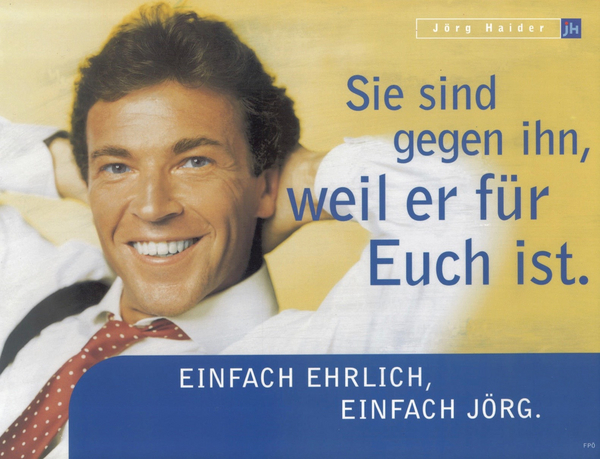National Council election 1994
At the National Council election of 9 October 1994, the FPÖ’s lead candidate was Dr. Jörg Haider. The Freedom Party achieved 22.5% of the vote, a 5.9 percentage point increase, as well as 42 National Council seats (+9).
The two governing parties, the SPÖ under lead candidate Franz Vranitzky and the ÖVP under lead candidate Erhard Busek, both suffered serious losses, but the SPÖ remained the strongest party.
Brief description of the election campaign
The motto of the Freedom Party campaign at the 1994 National Council election was “Einfach ehrlich, einfach Jörg” (“Simply honest, simply Jörg”). Central FPÖ slogans were tailored to the lead candidate, Jörg Haider, and included “Sie sind gegen ihn, weil er für Euch ist” (“They are against him, because he is for you”) and “Er sagt, was wir denken” (“He says what we think”). In this way, Haider was presented as a Robin-Hood-like politician, who was the only one who stood up against the SPÖ and ÖVP “establishment” and represented the interests of Austrian voters. So the focus was fully on the contrast between, on the one hand, Haider as a man of the people, and on the other, the “ruling class” of SPÖ and ÖVP, who were promoting party patronage and cronyism (Proporz) throughout the country
In modified form, this narrative was to carry the Freedom Party through subsequent elections. It rested on the desire for change that prevailed within the Austrian public, and which was increasingly placing both long-standing government partners, the ÖVP and the SPÖ, under pressure.
On 5 September 1994, in Vienna’s Palais Ferstl, FPÖ Federal Party Chairman Dr Jörg Haider MP gave a keynote speech entitled “Grundsätzliches zu Freiheit und Demokratie in Österreich” (“Fundamental aspects of freedom and democracy in Austria“). You can access this “Austria Declaration” (“Österreich Erklärung”) here.
Here, you can see an electoral confrontation in the ORF programme “Der Runde Tisch”, which took place on 21 September 1994 between Franz Vranitzky (SPÖ) and Jörg Haider. The topics were security and environmental policy, housing and foreigners.
The election result shows that this campaign and its contents were well received by the voters.
Election result
The following parties competed at the National Council election of 9 October 1994: SPÖ; ÖVP; FPÖ; Die Grüne Alternative; LIF; KPÖ; VGÖ/Vereinte Grüne Österreichs; BGÖ/Bürgerliche Grüne Österreichs; Freie Demokraten; ÖNP (Österreichische Naturgesetz-Partei); Nein - Bürgerinitiative gegen den Verkauf Österreichs; Christliche Wähler Gemeinschaft; Fritz Georg and Die Beste Partei.
The SPÖ and ÖVP suffered heavy losses, but were able to maintain first and second place; the FPÖ benefited most from the losses of the two governing parties. The fourth-strongest party was the Greens, the fifth-strongest was Heide Schmidt's Liberal Forum, which managed to enter the National Council for the first time.
Parties | Votes | Vote share 1994 | ± | Seats 1994 | ± |
SPÖ | 1,617,804 | 34.9% | -7.9% | 65 | -15 |
ÖVP | 1,281,804 | 27.7% | -4.4% | 52 | -8 |
FPÖ | 1,042,332 | 22.5% | +5.9% | 42 | +9 |
GRÜNE | 338,538 | 7.3% | +2.5% | 13 | +3 |
Liberales Forum | 276,580 | 6.0% | n.a. | 11 | +11 |
Government formation
After the election, the SPÖ and ÖVP negotiated a government coalition, which ultimately led to a new red-black federal government under Federal Chancellor Franz Vranitzky. However, that government already had to throw in the towel in 1995, and an early National Council election was held.

